
2024 was a prolific year for Sanford faculty and staff, with books covering the gamut of Sanford's key themes. Read more about recent books published by members of the Sanford community below.
Broadway in Benghazi: Comedy, Tragedy and Diplomatic Drama in Gaddafi's Libya
Anna Linvill

Linvill is the Coordinator of the Rethinking Diplomacy Program/Space Diplomacy Lab. Linvill is a former Arabic cryptologic linguist with a passion for opera and musical theater. She has previously written about the plight of migrants in Libya for Newsweek International and holds a master’s degree in international relations from the University of Oklahoma.
Summary
On the eve of the 2011 Arab Spring, Anna Linvill, an Arabic linguist and promising young singer, learns that her husband, Lt. Colonel Brian Linvill, has received orders to be the Defense Attaché at the U.S. Embassy in Tripoli, Libya. Leaving her dreams in long-term storage, Anna packs up her two young children and her musical scores and follows Brian into Gaddafi's Libya. In an historic setting of breathtaking natural beauty, Anna finds crumbling theaters, burned pianos, and a complex, creative civilization suffocating under decades of cruelty, fear, and civil neglect.

Corruption is rife, Gaddafi's brutal henchmen and all-seeing eyes are everywhere, human trafficking and wife buying are commonplace, innocent looking teenage girls are daring dissidents, and there are no rules- until you cross the wrong person. In Gaddafi's Libya, it is every man for himself.
Upon arrival, Anna and Brian join The Tripoli Players, an amateur theater group known for their risky, red-line crossing, cream pie throwing, singing and dancing filled musicals lampooning the Gaddafi regime. When they are hired to put on a touring Broadway review for the U.S. Embassy, the Tripoli Players become part of a complex diplomatic drama. They are stunned when the 2011 Arab Spring sets revolutionary fires across the Middle East, eerily echoing one of their most daring comedies. After the fall of the Gaddafi regime, it looks like the good guys have won, but soon, comedy turns to tragedy. The U.S. Ambassador, Chris Stevens, is murdered and Libya descends into civil war and anarchy. Soon, Anna, Brian, and the Tripoli Players learn that offstage, there is a fine line between a villain and a hero, and a tyrant lives inside each and every one of us, waiting for his cue.
Read more about the book here.
Governing After War: Rebel Victories and Post-war Statebuilding
Shelley Liu

Serial war or extended peace? What are the best indicators for peace after rebel victory? To better understand the potential stability and likely political legacies of rebel governments, we need to evaluate not why rebels are fighting (they are often fighting for legitimate ends) but how they organize during conflict.
Summary
The book explores how wartime processes affects post-war state-building efforts when rebels win a civil war and come into power. Post-war governance is a continuation of war: although violence has ceased, the victor must consolidate its control over the state through a process of internal conquest. This means carefully making choices about resource allocation toward development and security. Where does the victor choose to spend, and why? And what are the implications for ultimately consolidating power and preventing conflict recurrence? The book examines wartime rebel–civilian ties under rebel governance and explains how these ties—along with rebel governing institutions—shape the rebel victors' post-war various resource allocation strategies to establish control at the sub-national level. In turn, successfully balancing resources dedicated toward development and security helps the victor to consolidate power.

The book relies on mixed-methods evidence from Zimbabwe and Liberia, combining interviews, focus groups, and archival data with fine-grained census, administrative, survey, and conflict datasets to provide an in-depth examination of sub-national variation in wartime rebel behavior and post-war governing strategies. A comparison of Zimbabwe and Liberia alongside four additional civil wars in Burundi, Rwanda, Côte d'Ivoire, and Angola further demonstrates the importance of wartime civilian tie-formation for post-war control. The argument's central insights point to war and peace as part of a long state-building process, and suggest that the international community should pay attention to sub-national political constraints that new governments face. Findings offer implications for recent rebel victories and, more broadly, for understanding the termination, trajectories, and political legacies of such conflicts around the world.
Read more about the book here.
The Age of Grievance
Frank Bruni
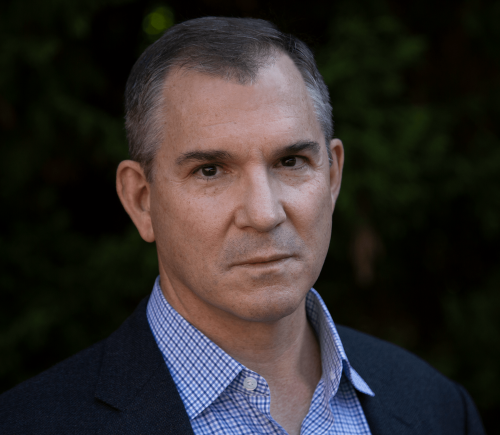
Frank Bruni, Eugene C. Patterson Professor of the Practice of Journalism and Public Policy, best-selling author, and celebrated New York Times columnist, has built a career that spans the political, cultural and culinary topics of our day. In his latest book, "The Age of Grievance", Bruni examines the origins of our current discontent in an age defined by acrimony and angst. The Age of Grievance is currently #6 on the New York Times bestseller list.
Summary
From bestselling author and longtime New York Times columnist Frank Bruni comes a lucid, powerful examination of the ways in which grievance has come to define our current culture and politics, on both the right and left.
The twists and turns of American politics are unpredictable, but the tone is a troubling given. It’s one of grievance. More and more Americans are convinced that they’re losing because somebody else is winning. More and more tally their slights, measure their misfortune, and assign particular people responsibility for it. The blame game has become the country’s most popular sport and victimhood its most fashionable garb.
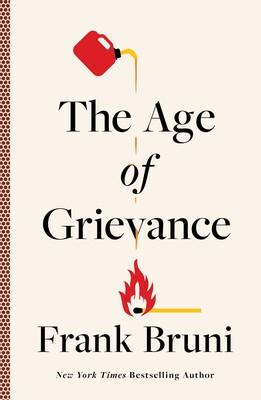
Grievance needn’t be bad. It has done enormous good. The United States is a nation born of grievance, and across the nearly two hundred and fifty years of our existence as a country, grievance has been the engine of morally urgent change. But what happens when all sorts of grievances—the greater ones, the lesser ones, the authentic, the invented—are jumbled together? When people take their grievances to lengths that they didn’t before? A violent mob storms the US Capitol, rejecting the results of a presidential election. Conspiracy theories flourish. Fox News knowingly peddles lies in the service of profit. College students chase away speakers, and college administrators dismiss instructors for dissenting from progressive orthodoxy. Benign words are branded hurtful; benign gestures are deemed hostile. And there’s a potentially devastating erosion of the civility, common ground, and compromise necessary for our democracy to survive.
How did we get here? What does it say about us, and where does it leave us? The Age of Grievance examines these critical questions and charts a path forward.
Listen to Bruni's narration of the book's introduction here.
Read more about the book here.
Evolutionary Tax Reform in Emerging Economies: an income-based approach
Robert Conrad

This groundbreaking work offers a unique perspective on tax reform in developing nations. Conrad proposes a framework known as "Collection-Driven Taxation," which prioritizes individual taxpayers and leverages advanced payments to enhance compliance. The approach integrates various tax types, including income tax, value-added tax, excise tax, and tariffs, to create a flexible and adaptable system that can evolve over time.
SUMMARY
One approach to tax reform in emerging economies is developed in this text. The approach, labelled ‘Collection-Driven Taxation’ is based on three elements: the taxpayer is always the individual; compliance is enhanced by the extensive use of advanced payments; and suppliers of goods and services, other than the primary inputs of capital and labour, serve as advanced payment agents who withhold or collect advanced tax from individual taxpayers. Income taxation, valued added taxation, excise taxation, and tariffs are supplemented by small business taxation and natural resource contracts, where relevant, and are coordinated to develop an initial framework that can evolve through time based on experience, the economy’s level of development, administrative capacity, and public understanding. The intent is to enable the system to evolve through time via a series of piecemeal changes until the primary revenue source is the income tax.
Read more about the book here.
American Covenant: How the Constitution Unified Our Nation—and Could Again
Yuval Levin

Yuval Levin is Sanford's 2024 Egan Professor. Levin is the director of Social, Cultural, and Constitutional Studies at the American Enterprise Institute (AEI), where he also holds the Beth and Ravenel Curry Chair in Public Policy. The founder and editor of National Affairs, he is also a senior editor at The New Atlantis, a contributing editor at National Review, and a contributing opinion writer at The New York Times.
At AEI, Dr. Levin and scholars in the Social, Cultural, and Constitutional Studies research division study the foundations of self-government and the future of law, regulation, and constitutionalism. They also explore the state of American social, political, and civic life, focusing on the preconditions necessary for family, community, and country to flourish.
SUMMARY
Common ground is hard to find in today’s politics. In a society teeming with irreconcilable political perspectives, many people have grown frustrated under a system of government that constantly demands compromise. More and more on both the right and the left have come to blame the Constitution for the resulting discord. But the Constitution is not the problem we face; it is the solution.
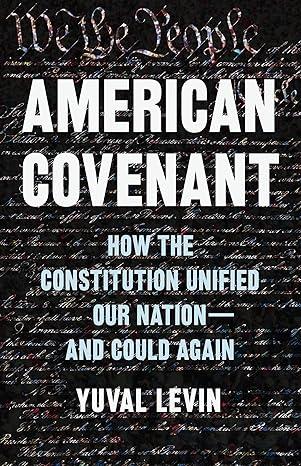
Blending engaging history with lucid analysis, conservative scholar Yuval Levin’s American Covenant recovers the Constitution’s true genius and reveals how it charts a path to repairing America’s fault lines. Uncovering the framers’ sophisticated grasp of political division, Levin showcases the Constitution’s exceptional power to facilitate constructive disagreement, negotiate resolutions to disputes, and forge unity in a fractured society. Clear-eyed about the ways that contemporary politics have malfunctioned, Levin also offers practical solutions for reforming those aspects of the constitutional order that have gone awry.
Hopeful, insightful, and rooted in the best of our political tradition, American Covenant celebrates the Constitution’s remarkable power to bind together a diverse society, reassuring us that a less divided future is within our grasp.
American Covenant discussed on NPR
Writer Yuval Levin thinks about frustrations with government in a divided nation - National Public Radio, August 28
Read more about the book here.
The Power of Black Excellence: HBCUs and the Fight for American Democracy
Deondra Rose

A powerful and revealing history of Historically Black Colleges and Universities (HBCUs), which have been essential for empowering Black citizens and for the ongoing fight for democracy in the US.
Summary
From their founding, Historically Black Colleges and Universities (HBCUs) educated as many as 90 percent of Black college students in the United States. Although many are aware of the significance of HBCUs in expanding Black Americans' educational opportunities, much less attention has been paid to the vital role that they have played in enhancing American democracy.
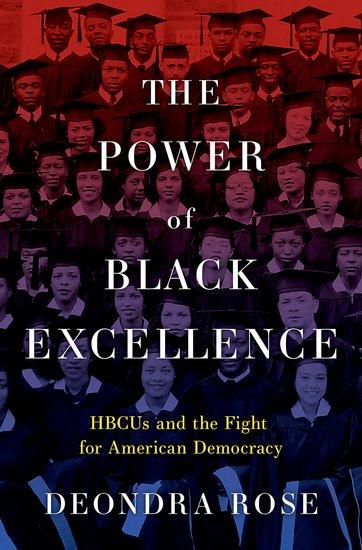
In The Power of Black Excellence, Deondra Rose provides an authoritative history of HBCUs and the unique role they have played in shaping American democracy since 1837. Drawing on over six years of deep research, Rose brings into view the historic impact that government support for HBCUs has had on the American political landscape, arguing that they have been essential for not only empowering Black citizens but also reshaping the distribution of political power in the United States. Rose challenges the conventional wisdom that, prior to the late twentieth century, the federal government took a laissez-faire approach to education. Instead, governmental action contributed to the expansion of HBCUs in an era plagued by racist policies and laws. Today, HBCUs remain extremely important, as evidenced by the outsized number of black political leaders--including Kamala Harris--who attended them. Rose stresses that policymakers promote democracy itself when they support HBCUs and their unique approach to postsecondary education, which includes a commitment to helping students develop politically empowering skills, promoting political leadership, and fostering a commitment to service.
A fresh look into the relationship between education and democracy, The Power of Black Excellence is essential reading for anyone interested not just in HBCUs, but the broader trajectory of Black citizenship in American history.
This is Rose's second book, and has already received positive reviews from policymakers, democracy experts, and cultural commentators from across the political spectrum.
Read more about the book here.
Beyond the Big Lie: The Epidemic of Political Lying, Why Republicans do it more, and how it could burn down our democracy
Bill Adair

Bill Adair, Pulitzer Prize winner, Knight Professor of the Practice of Journalism and Public Policy, and founder of PolitiFact, presents an eye-opening and engaging history of political liars and a vision for how to make them stop.
A seasoned political reporter, Adair brings unmatched experience to political fact-checking. His current leadership of Duke's Reporter's Lab (part of the DeWitt Wallace Center for Media and Democracy) allows him to investigate political falsehoods in detail, resulting in a book that illuminates one of the biggest crises of our time.
SUMMARY
Bill Adair knows a lie when he hears one. Since 2008, the site he founded, PolitiFact, has been the go-to spot for media members and political observers alike to seek the truth in an increasingly deceitful world. Since the site’s launch, politics’ tenuous relationship with the truth has only gotten weaker—and weirder.
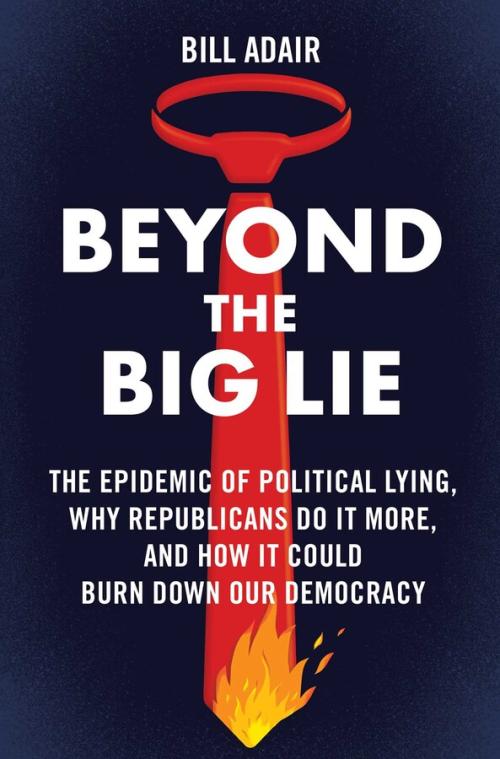
In this groundbreaking book, Adair reveals how politicians lie and why. Relying on dozens of candid interviews with politicians, political operatives, and experts in misinformation, Adair reveals the patterns of lying, why Republicans do it more, and the consequences for our democracy. He goes behind the scenes to describe several episodes that reveal the motivations and tactics of the nation’s political liars, show the impact they have on people’s lives, and demonstrate how the problem began before Donald Trump and will continue after he’s gone. Adair examines how Republicans have tried to change the landscape to allow their lying by intimidating the news media, people in academia and government, and tech companies.
An award-winning journalist and pioneer in political fact-checking, Adair is uniquely able to tell this story. With humor and insight, this remarkable book unpacks the sad state of our politics, but also, provides solutions to put an end to American political deceit once and for all.
"Beyond the Big Lie" ON THE DAILY SHOW:
The Daily Show: Bill Adair - “Beyond the Big Lie”
Read an excerpt from "Beyond the Big Lie"
The Atlantic: Why Politicians Lie
Read more about the book HERE.
Race Traffic: Antislavery and the Origins of White Racial Victimhood
Gunther Peck

Gunther Peck, Associate Professor of History and Public Policy at Duke University, has dedicated his career to exploring the ethical stakes of historical inquiry and inspiring students to become transformative leaders. A recipient of the Bass Chair for excellence in teaching and scholarship, his work connects the past to pressing ethical dilemmas of the present. His latest book, Race Traffic: Antislavery and the Origins of White Racial Victimhood (UNC Press), examines the historical intersections of human trafficking and race.
SUMMARY
Published by the Omohundro Institute of Early American History and Culture and the University of North Carolina Press
Fantasies of white slavery and the narratives of victimhood they spawn form the foundation of racist ideology. They also obscure the lived experience of trafficked servants and sailors in the seventeenth and eighteenth centuries. Gunther Peck moves deftly between the Atlantic and Mediterranean worlds to discover where and when people with light skin color came to see themselves as white. Separating fact from fiction, and paying close attention to the ideological work each performs, Peck shows how laboring women and men leveraged their newfound whiteness to secure economic opportunity and political power.
Peck argues that whiteness emerged not as a claim of racial superiority but as a byproduct of wide-ranging and rancorous public debate over trafficking and enslavement. Even as whiteness became a legal category that signaled privilege, trafficking and race remained tightly interwoven.

Those advocating for the value of whiteness invoked emotionally freighted victimhood, claiming that so-called white slavery was a crime whose costs far exceeded those associated with the enslavement of African peoples across the Americas. Peck helps us understand the chilling history that produced the racist ideology that still poisons our politics in the present day.
Alongside the book release, Peck penned this op-ed for TIME about the racial ideologies in our current political conversations, particularly the 2024 presidential campaign.
Read the TIME commentary here:
The Centuries of History Behind a Key Trump Strategy | TIME
